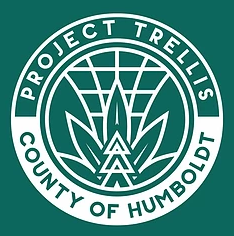Harvest is over for the year and Lorelie Sandomeno surveys her farm. At 2500’ elevation in the northeastern mountains of Humboldt County, Sunrise Mountain Farms is bordered by national forest and surrounded by wild nature. The air is exceptional, the views extensive. Lorelie and her husband David are passionate farmers applying regenerative and sustainable cultivation practices such as Korean Natural Farming and permaculture. It is early December and the rains have started, but erosion control is not as big a concern this year: thanks to a micro-grant from Humboldt County’s Project Trellis, Lorelie and David are building infrastructure like raised beds and landscaping for erosion and pest control. “We had wanted to make improvements for some time, but our budget was swallowed by the many fees associated with permitting. The micro-grant gave us help for a specific project,” explains Lorelie.
Micro-grants are one of three tiers in Humboldt County’s “Project Trellis” program, the brainchild of the Economic Development department (the other two tiers are an Equity Program and a Marketing & Promotion program). The Micro-grant program diverts the County’s Measure S funding and provides cannabis businesses an opportunity to apply for funding to cover business-related expenditures. Humboldt County is the only county with a program to reinvest cannabis tax dollars back into the community.
“This is an important way to help with the survival and long term growth of Humboldt County’s cannabis community,” notes Peggy Murphy, Economic Development Specialist with Humboldt County. “Overall the intention of the Cannabis Business Micro-grant program is to bolster and serve Humboldt County’s cannabis businesses as they work to come into compliance.”
Hannah Joy is vice-chair of the Trellis Committee, one of several committee members tasked with reviewing and ranking grant applications. As a Humboldt local, Hannah notes that “cannabis has shaped our communities. Generational cannabis farmers especially have a special place in my heart because of how unique they are in the world, and the opposition they have weathered. Not only do some of these businesses really truly need a financial boost, I think they also deserve the community support and recognition. I hope Humboldt in general sees this for what it is…giving a little bit back to the hard working and passionate families that give this place international renown.” Hannah offered to join the committee, seeing it as “an opportunity to be involved in helping farmers and other operators continue to grow as sustainable businesses.”
David Dickinson, owner and operator of Woody Ridge Farm, needed funding to help with completing a rainwater catchment system on his farm. “Ground water is not ideal for plants, it tends to be high in dissolved solids, my well water also has high levels of sodium. In Humboldt we don’t sit on top of large fossil aquifers, our groundwater is seasonally recharged by rainfall, consequently, the more water we remove from the ground, the less that winds up feeding streams, creeks and rivers.” Despite having already spent almost $20,000 on development of his rooftop water catchment system, he still needed the last component: water tanks. The micro-grant made it possible for him to purchase four 5,000-gallon water tanks. “It benefits my productivity and it lowers my environmental footprint,” he says, and advises potential applicants to “be specific with what you need and how it will help your operation.”
To date approximately $180,000 has been awarded in micro-grants to eligible Humboldt cannabis businesses. In the upcoming funding cycle there is approximately $516,492 that can be awarded. Individual applicants may apply for up to $10,000, must be Humboldt County residents, and their businesses must be majority-owned by County residents. Up to $50,000 can be awarded to traditional agricultural cooperative associations, cannabis cooperative associations, nonprofit cannabis associations, and road associations. In addition, applications are scored based on the forecasted economic impact, environmental impact, and capacity to effectively complete the project. As a groundbreaking initiative, the County had to develop a process that had no precedent. “Covid definitely took a toll on our abilities as a committee,” notes Hannah. Several adjustments and clarifications had to be made to the micro-grants program, and the process now appears to be streamlined. “The Economic Development team was helpful and kind,” says Lorelie: “I’m really glad the County has put funds back into the community to help small farms move forward in a competitive market.”
“I am particularly excited to see regional organizations apply for the micro-grants to build out their community programs, which may include developing appellation petitions,” said Natalynne DeLapp, executive director of HCGA. “In Humboldt, with the Project Trellis micro-grant program, we have a unique opportunity and financial support system to fund the development of programming that would otherwise have to be funded by individuals and not the collective.”
The next round of grant funding closes December 18, but Peggy Murphy confirmed that there are future rounds.
For cannabis businesses in Humboldt thinking about applying for a grant, more information can be found at http://gohumco.com/236/Project-Trellis-Micro-Grants.



